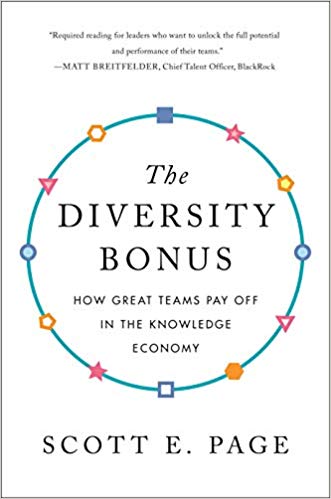Some years ago, I joined a writing team at a production company in New York. We were hired to create cross-cultural training material, designed to help people do business overseas.
The content was broad and deep, and included societal attitudes as well as practical tips like how to greet people and what to give as a gift.
This was a dot-com start-up, and the team leader, a New Zealander in his late 30s, had free rein to put together his dream team of writers. The result was a motley crew of six, including him. We represented a wide range of ages, nationalities, ethnicities, religions, sexual orientations, and social classes.
The way we looked and spoke was a constant reminder of our diverse identities. But what we said revealed a different, arguably more powerful, kind of variance: cognitive diversity. We all thought differently.
Diversity Delivers
In his book, “The Diversity Bonus: How Great Teams Pay Off in the Knowledge Economy,” Scott E. Page argues that having a varied workforce can bring benefits far beyond that warm fuzzy feeling you get from doing the right thing.
A professor at the University of Michigan, he’s seen diversity deliver numerous bonuses in organizations of all shapes and sizes. From better problem solving and improved innovation to, ultimately, an increased bottom line.
His position is supported by Alison Reynolds and David Lewis in the Harvard Business Review, where they contend that more cognitively diverse teams solve problems faster.
Page's book explores two types of diversity in the workplace: identity and cognitive. He focuses more on the latter as it’s less well known and packs more of a punch.
Cognitive diversity can be influenced by identity diversity, but it can also have nothing to do with it. Page attributes cognitive diversity to our personal “cognitive repertoire.”
Five Steps to Better Outcomes
It’s a fancy term that, for him, encompasses five components: information, knowledge, heuristics, representations, and mental models or frameworks.
“Information” is facts you know about the world, for example the height of Mount Everest. “Knowledge” refers to your practical understanding of a concept or topic: this might be the best and safest way to climb Everest.
“Heuristics” are the tools, models or strategies you use to solve a problem or generate new ideas. You derive these strategies from previous experiences with similar problems; they include things like trial and error and the rule of thumb.
“Representations” are the way you see and categorize things, while “mental models” simplify complex ideas. Sometimes these are assumptions, like assuming the stock market will fall or rise in response to a particular news event. The most useful mental models “align with facts,” Page says.
Naturally, the more repertoires you can draw on to make decisions, design products, or solve problems, the more options emerge. And, in theory at least, the better the outcomes will be: cognitive diversity = bonus.
Insight Informs Product and Process
Let’s return to dot-com-era New York. Five of us are sitting in a darkened room on 52nd Street in Manhattan. We’re focused on some text projected on the wall, a work in progress that we’re finessing together.
Our identity diversity is apparent in how we look and dress. But what of our cognitive diversity? One team member is a journalist, another a book editor, and two are academics. The fifth is a web coder and the sixth a former branding consultant.
We’re all graduates and between us we’ve notched up nearly 100 years of professional experience in close to a dozen countries. For the creative work we’re doing, that range of knowledge and experience improves our output.
We can tap into one another’s cognitive repertoires, probing for insight that informs not just the content we’re producing, but also our process.
Better Together
We get quicker, more efficient, more accurate. And importantly, we all feel like we’re making a difference, because we all are. This conjures up that elusive ingredient that can transform any endeavor: intrinsic motivation.
Page’s book gives a great overview of diversity in the modern workplace and is packed with research and data, as well as tips. For instance, he stresses that diversity for diversity’s sake is a waste of time. It can even be detrimental, especially for simple, routine tasks.
If you’re trying to maximize productivity on an assembly line, for instance, focus on hiring the fastest and most competent workers. It really doesn’t matter how diverse they are, Page argues.
More complex, knowledge-based work is where diversity comes into its own, and cognitive diversity, in particular, can deliver rich rewards.
Download the “Diversity Bonus” Book Insight
We review the best new business books and the tested classics in our monthly Book Insights, available in text or as 15-minute audio downloads.
So, if you’re a Mind Tools premium club member or corporate user, download or stream “The Diversity Bonus” Book Insight now.
Or, if
you’re not already signed up, join the Mind Tools Club and gain access to our 2,400+ resources, including
390+ Book Insights. For corporate membership, book a demo with one of our team.
What are your experiences of cognitive diversity at work? Share your experiences in the Comments section, below.







